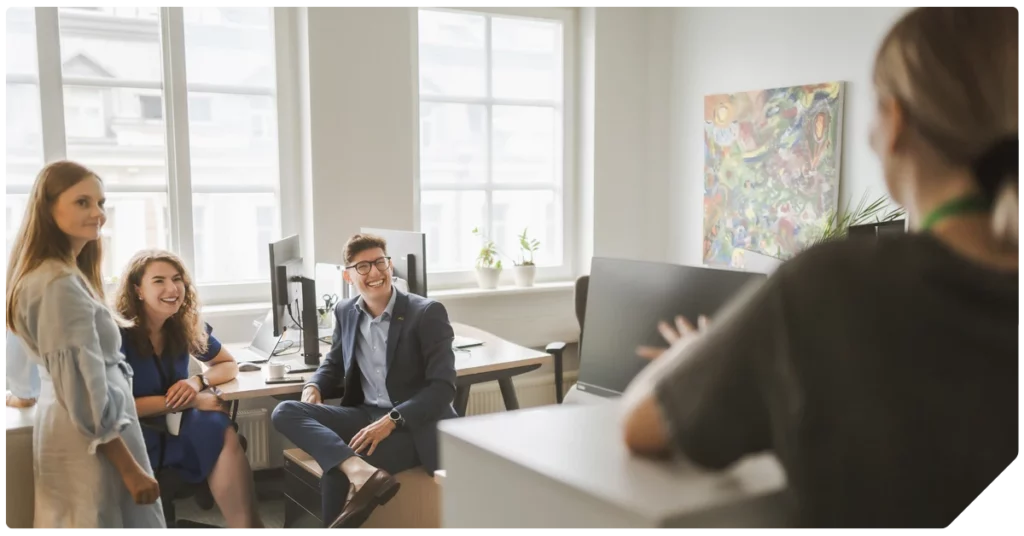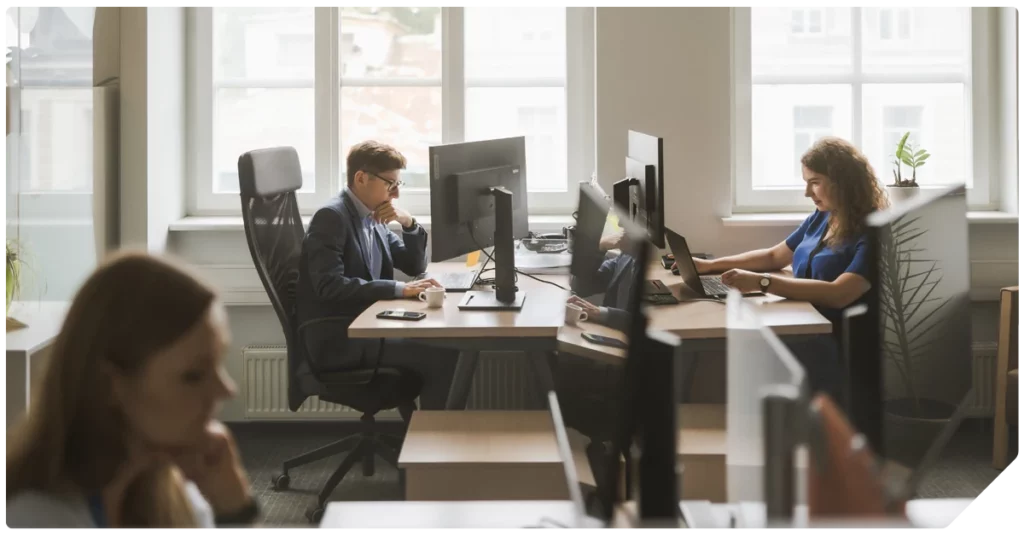- en
Ricardo Schmitz
Coming to Lithuania for the first time as an exchange student, Ricardo now works at Deloitte as a Senior Transfer Pricing Consultant. Like a true busy bee, he is also pursuing a PhD and teaching Law on the side. With Ricardo, we discussed relocating to Lithuania twice, enjoying a niche hobby, and working at a Big 4 company.

I think that career opportunities here are excellent. It’s a great moment to be here, to fast-track your growth, and to get an experience you wouldn’t get in other, bigger countries.
What brought you to Lithuania?
In 2018, my journey brought me here as an Erasmus student. At the time, I was studying in Portugal on a scholarship for a specialised programme that required six months abroad. Several universities were offered as options, including traditional choices like Germany and France, but among them was Lithuania. In the end, Lithuania was the perfect fit – the programme was very attractive, and the subjects I wanted to study were taught in English.
That’s how I ended up in Lithuania for the first time. It was my first time in Eastern Europe, actually – up to that point, my Eastern frontier had been Germany, so moving here was quite an adventure for me. I loved it here from the very beginning, so I soon decided to extend my stay to twelve months and even got an internship at Deloitte during my second semester. Afterward, I moved back to Brazil and then Portugal. Everything was fine, but for some reason, I didn’t feel happy.

At the time, I was teaching law at the Mykolas Romeris University in Vilnius. Teaching online had been my routine, but in 2021, as the Covid pandemic eased, the university proposed a return to in-person teaching. At the same time, I was already contemplating a move back to Lithuania, making the timing ideal. After resigning from my job in Portugal, I reached out to Deloitte to see if they’d take me back—they did—and I relocated to Vilnius. It’s been two years since I made Vilnius my home.
What were your first impressions when you came to Lithuania?
The image of Lithuania I had in my mind was pretty stereotypical. I had no contact with the country before and knew no one who had been here previously, so my only reference was American movies that usually show post-Soviet countries in a terrible light. But what I saw here was a very European city with a lifestyle that reminded me of the Nordic countries. Vilnius is very clean, green, and organised, and it seems that it cares about the well-being of the people who live here. That was my impression from the very beginning. I now live in the city centre, but even when I stayed in the outskirts, I felt very comfortable here.
You relocated to Lithuania twice. How did the process go?
I was living in Portugal before relocating both times, which made the process easier. I don’t have an EU passport, but Brazilian nationals don’t need visas to come here as tourists, which was another facilitating factor. So if you want to move to Lithuania from Brazil, you can come as a tourist and, if you meet all the requirements, you can go to the Migration Office and sort out your documents. In my experience, this process was pretty okay, the only difficulty being the language barrier at the Migration Office. But they usually have at least one person who speaks English there, so while it’s not ideal, it’s manageable.

What do you like about Vilnius the most?
I feel like this city offers the perfect balance between buzz and calmness. There’s a great number of parks and not much noise in the streets save for a traffic jam here and there. At the same time, you guys have such a creative mindset – there is always a nice event, exhibition, or celebration to attend. So I feel that Vilnius is a mix of green, calm countryside and a vibrant, creative, modern European capital. I’ve been to a lot of places, and I’ve never found such balance. And I think that sometimes locals don’t appreciate it enough. When Lithuanians tell me that they’re very surprised I came here, I always think ‘Guys, you have such an amazing thing going here, you should value it more!’ Yes, the weather might be a bit tricky, but overall, there are many really good reasons to come here.
What has been the most challenging over your time in Lithuania?
In general, I have three categories of challenges. The first is, obviously, the weather. Coming from the warmest region in Brazil, it was quite a crazy change. But I learned how to dress for the cold season quickly, and you have a well-prepared infrastructure for cold days. I live in the Old Town, so my building is quite old as well, but it’s still very warm and comfortable in winter. The next challenge was food. It’s very different to where I come from – you like potatoes a lot!
But ultimately, I feel like the main challenge was people. Lithuania is culturally opposite from Brazil – people here are colder, more formal, and distant. On the other hand, I believe that I grew a lot as a person around Lithuanians. I feel like I can trust people more here – when they’re your friends, they really are your friends. I think that in Brazil, we’re sometimes too nice, too extroverted, and we might come off as a little impolite as well. So here, I learned to be more mindful of everyone’s space.
Tell me about your role at Deloitte. What do you enjoy in your job?
After a recent promotion, I am now a Senior Transfer Pricing Consultant. My team and I consult multinational groups, either established in Lithuania and operating abroad or vice versa, on how to comply with transfer pricing regulations. This has an impact on the income tax they pay.

At Deloitte, we have a pan-Baltic team. We are a very integrated practice, so I work with people from Latvia and Estonia daily. That’s one level of international I have in my job. But Deloitte is the biggest of the Big 4, and with that comes an international network of colleagues and clients. Let’s say we support a client from the US that operates in Lithuania – chances are that it is also supported by our office in the US. In transfer pricing, any decision or change made in one country has an automatic impact on another, so we need to come up with consistent and compatible solutions. This means I have many joint projects with Deloitte colleagues abroad. So all in all, my work is extremely international.
As for what I enjoy in my work, there are many things. People might think that taxes are boring, that a tax consultant just sits at his desk with his back bent over an Excel sheet full of numbers. But I feel that my work is very motivating. Every project – even those that seem like simple compliance projects at first – poses a different challenge. At work, I always need to think outside of the box. For example, just this past week I had an interesting brainstorming session with my Polish colleagues. So the nature of the job is quite exciting, which I like. In Vilnius, I also love the office location. It’s very central, and I live just a stone’s throw away, so I can walk to work daily.
You are also studying for a PhD and you teach Law at university. How is it going?
I’m studying in a double degree programme at the University of Lisbon and Mykolas Romeris University. As soon as I started my PhD, I got an invitation from Mykolas Romeris to become an assistant lecturer and teach seminars on international tax law. I had wanted to be a professor since I was a kid – back then I didn’t even know what I wanted to teach – so I readily agreed.
Practice and academia, in my view, complement each other perfectly. Professors disconnected from reality have never appealed to me, just as I wouldn’t want to be a practitioner who sticks to the same methods for years without questioning, updating, or thinking creatively. For me, teaching while working full-time is a little challenging in terms of time management and workload, but I feel that I’m dealing well with both. Overall, teaching in Lithuania has been an amazing experience so far.
How would you describe the work culture in Lithuania?
I think that career opportunities here are excellent. Let’s take Deloitte as an example. If you want to work at Deloitte in Portugal, for instance, it’s incredibly hard to get in, and even if you do, there are 20 other people doing the same job as you. Even if you’re good, you won’t have that many opportunities, and your upward mobility won’t be quick. I worked in a similar company to Deloitte before coming to Lithuania and I never had contact with my managers there. We had a much bigger team, so the view I had of our work was never the full picture.
Here, it’s much different. In our pan-Baltic transfer pricing team, I’m the only one based in Lithuania. It means that I’m talking not only with my managers but also with my directors on a daily basis. I feel that I’m exposed to more interesting work and more challenging opportunities. And there are many opportunities out there – the market in Lithuania still has space for you to grow, to show yourself and your skills. It’s a great moment to be here, to fast-track your growth, and to get an experience you wouldn’t get in other, bigger countries.

What advice would you give to people moving to Lithuania?
What I would tell myself if I was moving here now is to not be afraid of the stereotypes I had about Lithuania. I think that coming here, you simply need to be open to exploring and getting to know the people better, despite them being a little cold at first. I feel that this way, you can embrace the beat of Lithuanian life, which makes everything much, much easier.
What do you do on your days off?
Because I both work and teach, my work-life balance is currently a little skewed towards work. But I live in the city centre, which makes it easy to both take walks and party in the Old Town. In my free time, I also love to do sports. I often go to the Baltasis Tiltas to play volleyball, and I run – Vilnius has all these amazing places to run and quite a few races you can participate in. I like that Lithuania has a sports culture, and I see a lot of people lead an active lifestyle here.
Another favourite pastime of mine is curling. I started playing it before moving to Lithuania and continued playing here. Curling is not particularly popular here, but for such a niche sport, we have a lot of teams. Last year, I participated in the mixed doubles category in the Lithuanian championship. We usually play in the brand-new ice arena in Kaunas. The train ride there only takes an hour – when I was working in Brazil, it took me the same amount of time to get four kilometres to work because of traffic jams!
After moving here, I also embraced the local religion – basketball. I’m a Žalgiris fan, so I go to Kaunas not only for curling but also to watch a game.
The interview was conducted in September 2023.